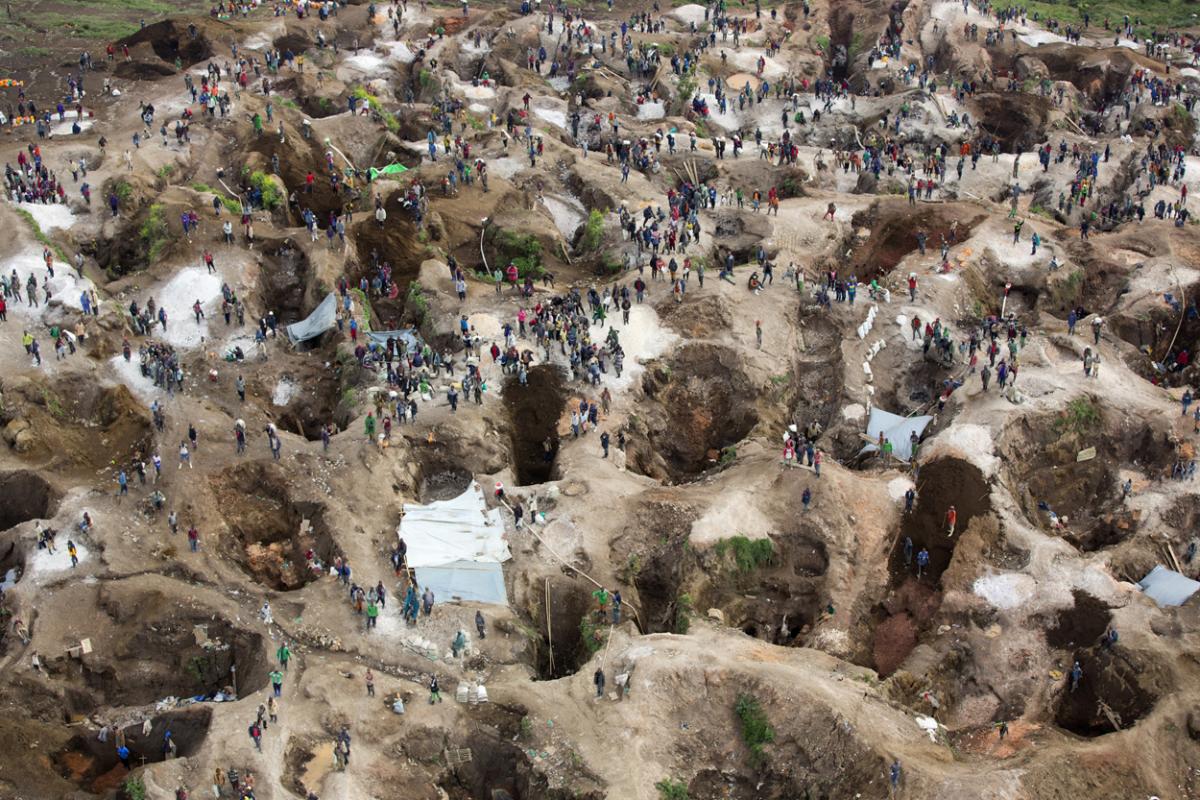
Ban on artisanal and small-scale mining
Small-scale mining is a source of livelihood for hundreds of thousands of workers and millions of dependents in Ghana. However, in 2017 a government ban was issued on small-scale mining, directed at both licensed and unlicensed miners based on the fact that the mining causes both water and air pollution. In this blogpost Eric Tei-Kumandoe from the University of Ghana describes how the ban has cut off people from their source of livelihood and forced them to seek means of survival elsewhere – and he asks the pressing question of why this form of mining is responded to by a ban when larger mining businesses’ effects on the environment are ignored.
Auntie Adwoa is a baker and a beneficiary of a government intervention in small-scale businesses implemented by the Business Advisory Centre of the East Akyem Municipal Assembly. At the time of our visit to Kyebi in March 2019 all was not well in the household of Auntie Adwoa. Her oven, which was sited on her compound had been out of operation for several weeks and she had fears of a time ahead where the daily bread of her household would not be guaranteed. She was already living in a grim situation of having her daughter’s tertiary education put on hold due to dwindling fortunes at home. Her present alternative of harvesting fuelwood from the bush was also under threat due to what seemed like an incipient land conflict in her part of town.
Over 369 kilometres from Kyebi, in the old mining town of Tarkwa where a European mining company made one of the earliest forages in colonial Ghana, we met Esther and Nancy, two young women. Earlier, they had a regular income with which they supported their families and did not have to depend on their husbands for everything. Their financial independence had slipped through their fingers and they now had to demand from their husbands, things they once provided for themselves.
The loss of business and financial independence in Kyebi and Tarkwa is an outcome of the government ban on small-scale mining. The Kyebi case illustrates this outcome for non-miners while the Tarkwa case does the same for miners. Due to the ban, those who made a living from artisanal and small-scale mining no longer had money, and the direct consequence of their loss was reflected in the lives of those who ran other businesses in the two towns. This illustrates the direct and indirect dependence on mining in the various communities affected by the ban.
A national ban on all forms of small scale mining, including operations licensed by the Minerals Commission cut off hundreds of thousands of workers and millions of dependents from their source of livelihood
The government ban on artisanal and small-scale mining, which was issued in February 2017, was directed at both licensed and unlicensed miners. The decision was based on overwhelming evidence of environmental destruction presented through an intense media campaign popularised by the hashtag #stopgalamseynow. Galamsey is the local term for artisanal mining. This campaign employed visual and audio-visual tools in its work. On the visual side, two categories of images were most popular: discoloured rivers and crudely ruined forests reserves and farmlands. These were supported by audio-visual narratives centring on the difficulties of the Ghana Water Company in producing water for parts of the country as a result of the pollution of rivers. The battlegrounds were radio, television and social media where these stories trended with their hashtags. Small-scale miners had effectively been cast in a “them against us” narrative. By the offend of 2016, these agitations had reached their apogee with a decisive move from the government. A national ban on all forms of small scale mining, including operations licensed by the Minerals Commission cut off hundreds of thousands of workers and millions of dependents from their source of livelihood.
While environmental destruction is a matter of serious concern and deserves effective policy attention, the media and government in Ghana have not been consistently vocal about pollution by large-scale commercial mining companies. In the communities, I was awakened to the reality that mining communities have lived in a constantly polluted environment for many years. In Tarkwa, we heard accounts of multiple experiences of polluted water bodies, polluted air, evictions from homes and farms without compensation. In cases where compensation was paid, amounts were determined unilaterally by the corporations. One of the farmers perceived this as adding insult to injury.
We were fortunate to see on our journey to one of the smaller communities in the Tarkwa Nsuaem municipality, Bonsawire, an unfortunate spectacle of a ruined water body. It looked brown and dead. In response to our question on what happened to the water, we were told that one of the major mining companies, whose mountainous debris stood a few metres away from the water, was responsible. Large-scale commercial mining in Ghana has had its share of problematic environmental activities. Not only the water bodies and forests but also the air, farms and homes in their catchment areas have on occasions been either polluted or permanently destroyed. To cap it all, the company has employed the services of state security forces under whose gaze the citizens live. On occasion, community members have been harassed when they were just in search of their daily bread. These activities by the company have harmed the environment and the people, yet have neither made the news nor attracted government attention in the way that artisanal and small scale mining have.
Why is one form of environmental destruction ignored and the other attended to by a ban? A quick response to this question would be to focus on the scale of mining. But a response centring on scale presupposes that the minor water bodies, which are connected to the larger ones, do not matter as much. It also suggests that the people who depend on this water also do not matter as much as those who depend on the major ones. This suggests a disconnect in thinking and action at the level of the central government and the urban elite. Major rivers are connected to the minor waters which serve rural communities and it is only a matter of time before the problems associated with ruining these minor water bodies will turn to harm the people of urban Ghana.
It is important to properly recognize this disconnect in thinking on the part of the state and media so as to chart a new path in policy choices for government and narrative choices for the media and the people in their sphere of influence. Failing to reverse the discriminatory approach could eventually rip apart communities and perpetuate the urban bias in addressing problems. In Obuasi, this state bias for mining corporations and the urban elite has led to a crisis which resulted in many unfortunate outcomes, one being the death of a key employee of a mining corporation.
Auntie Adwoas and Esther and Nancy and their dependents affected by this will turn to new ways of seeking a livelihood. Among their options will be a return to mining deeper in the forests and rivers on the blind side of the state apparatus. Others might find new opportunities while others again might turn to activities that may not be safe for the rest of the country. Already, crime rates have gone up in mining communities in the wake of the ban.
Read more about the project: D-SIP – Domestic Security Implications of UN Peacekeeping in Ghana

